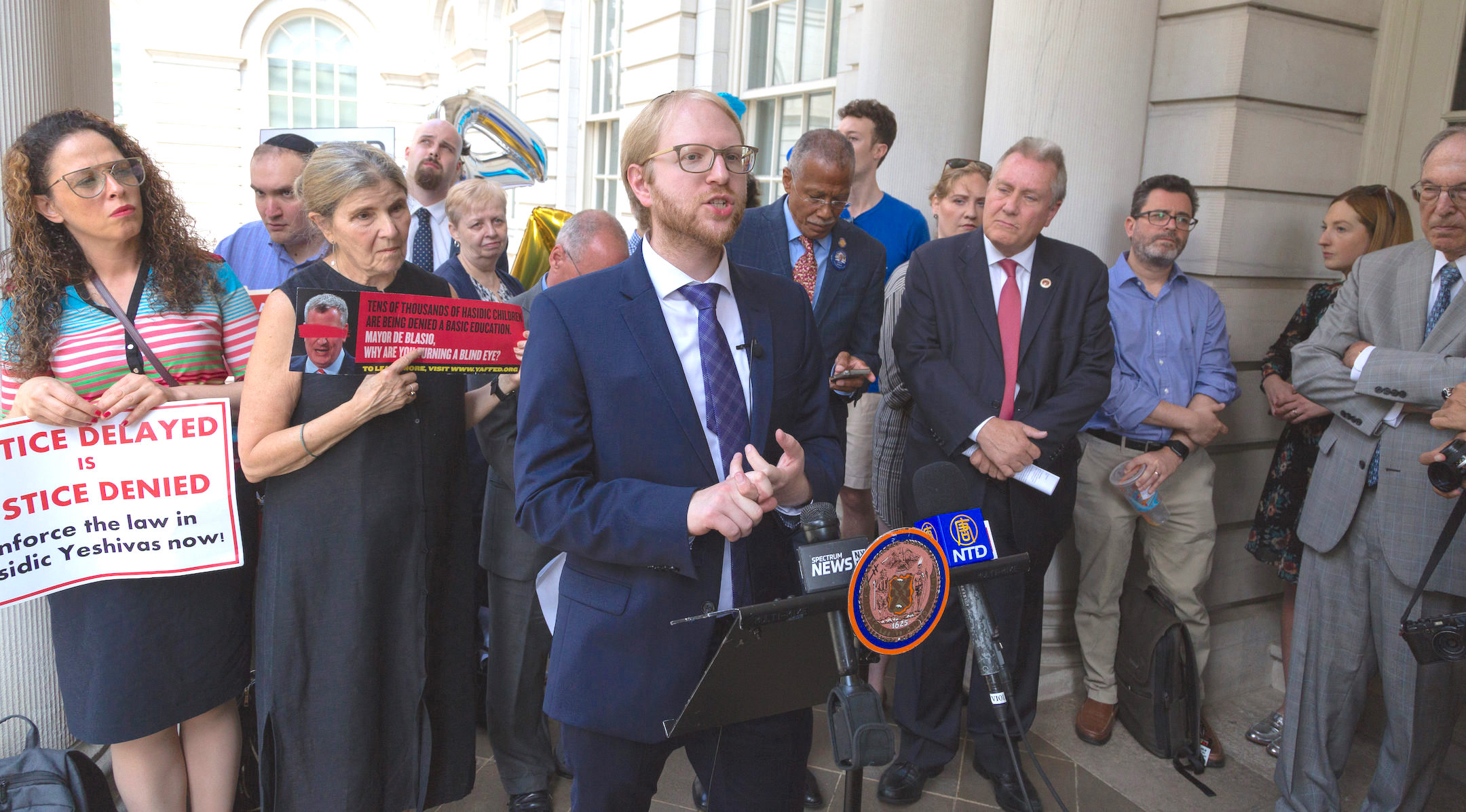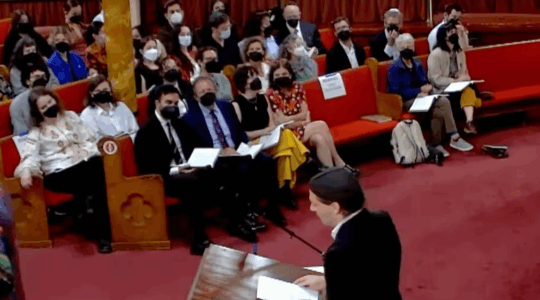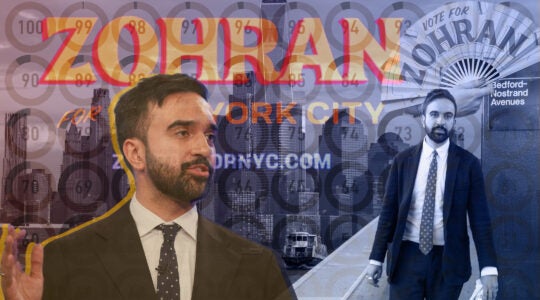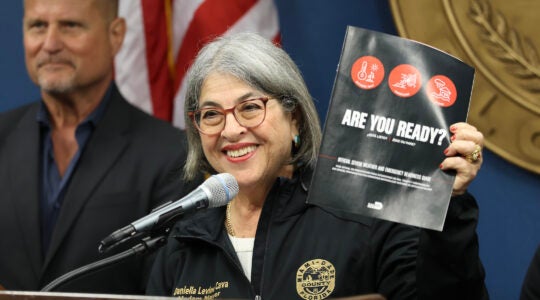Naftuli Moster spent a decade as an activist accusing haredi Orthodox yeshivas of denying students a basic education and the tools needed to become independent adults. He later launched a muckraking news site targeting misconduct by Orthodox communal leaders.
Now, he has made a stunning disavowal of both his activist past and recent journalistic endeavors.
He considers the confrontational tactics he once embraced misguided and says he has developed a deep appreciation for the Orthodox way of life, which he had previously rejected. His reckoning, he says, was fueled by a growing distrust of progressive politics and the motivations of his former allies, as well as concern that his outspokenness harmed his many relatives who remain in the community.
Moster revealed his personal transformation in an interview released Sunday with YouTuber Frieda Vizel, a former member of the Satmar Hasidic community known for her often critical commentary on Hasidic life and culture.
“I have some regrets about how I went about my advocacy and, frankly, I probably would have even been more successful if I had done things differently,” Moster told Vizel.
He said he asked Vizel to interview him on her popular YouTube show because he wanted the public to stop associating him with the issue of secular education standards at yeshivas. It was an issue he helped bring to the forefront of public debate as the founder and face of the advocacy group Yaffed, which stands for Young Advocates for Fair Education. He left the group in 2022.
“When anything, anytime, happens in the community, in the haredi community, especially if it involves education … I’m still that, kind of, boogeyman and I felt like it’s important for people to know that I’ve moved on,” Moster said.
Moster has long been a target of intense scorn in the Orthodox world. A publication once called him a “rabid self-hating Jew” and Moster reported said he’s been called a “Nazi” for his activism.
Moster’s announcement comes weeks after a major setback for the movement he once led. Just as the New York State Education Department was beginning to ramp up enforcement of a law requiring that yeshivas, like all private schools, teach subjects like English and math to a minimum standard, the effort was gutted by the governor and legislature. The move to weaken oversight of religious schools was seen as a victory for Orthodox leaders wary of state interference.
It’s too soon to tell how Moster’s self-reinvention will affect the ongoing debate over secular education standards for religious schools, but his recent interview is already stirring conversation within the Orthodox world.
Writing in the haredi publication VIN, Rabbi Yair Hoffman described Moster as someone who had caused significant damage to Orthodox Jewry by shaping negative perceptions of the community among policymakers and the broader public. Still, Hoffman praised Moster for expressing regret and called his return to Jewish observance a welcome, if incomplete, development.
“The interview reveals remarkable personal growth and genuine regret,” Hoffman wrote. “Moster’s journey back toward his people, imperfect as it may be in its theological foundations, represents genuine progress that deserves recognition.”
Asked what Moster’s announcement meant for the cause of secular education at yeshivas, Yaffed executive director Adina Mermelstein Konikoff released a statement.
“We remain laser-focused on our mission to ensure that every child in New York State receives a sound basic education, regardless of the type of school they attend,” Konikoff said. “We’re proud to have built a movement with broad support across the political spectrum, including volunteers and advocates from within New York’s Hasidic communities.”
Phylisa Wisdom, the executive director of the New York Jewish Agenda, a liberal advocacy group, has worked with both Konikoff and Moster. She said she considers Moster a “hero” but added that the cause he once championed is now larger than him.
“Moster started something really important,” Wisdom said in an interview. “I’m someone who was brought along because of him and because of his passion for this topic, and how articulately and ably he communicated the issue to the world. And the issue persists, whether it’s something that’s important to him to do advocacy around or not.”
Wisdom said her allies among state policymakers care about the education of Orthodox youth and won’t be deterred because Moster has distanced himself from the issue.
“I don’t think policymakers are thinking about how Naftali Moster feels about this issue anymore,” she said.
In an interview with the Jewish Telegraphic Agency in May, Konikoff acknowledged that her group is at a crossroads after the state’s decision to retreat from enforcing secular education standards, which she called “shocking and devastating.”
“This is a bump in the road and we’re exploring all of our options,” she said. “The regulations have been gutted, but they’re not totally gone, so we’re looking at the language very carefully … We’re exploring what that looks like, right, and ways that we can be most impactful.”
Moster did not immediately respond to an interview request from JTA.
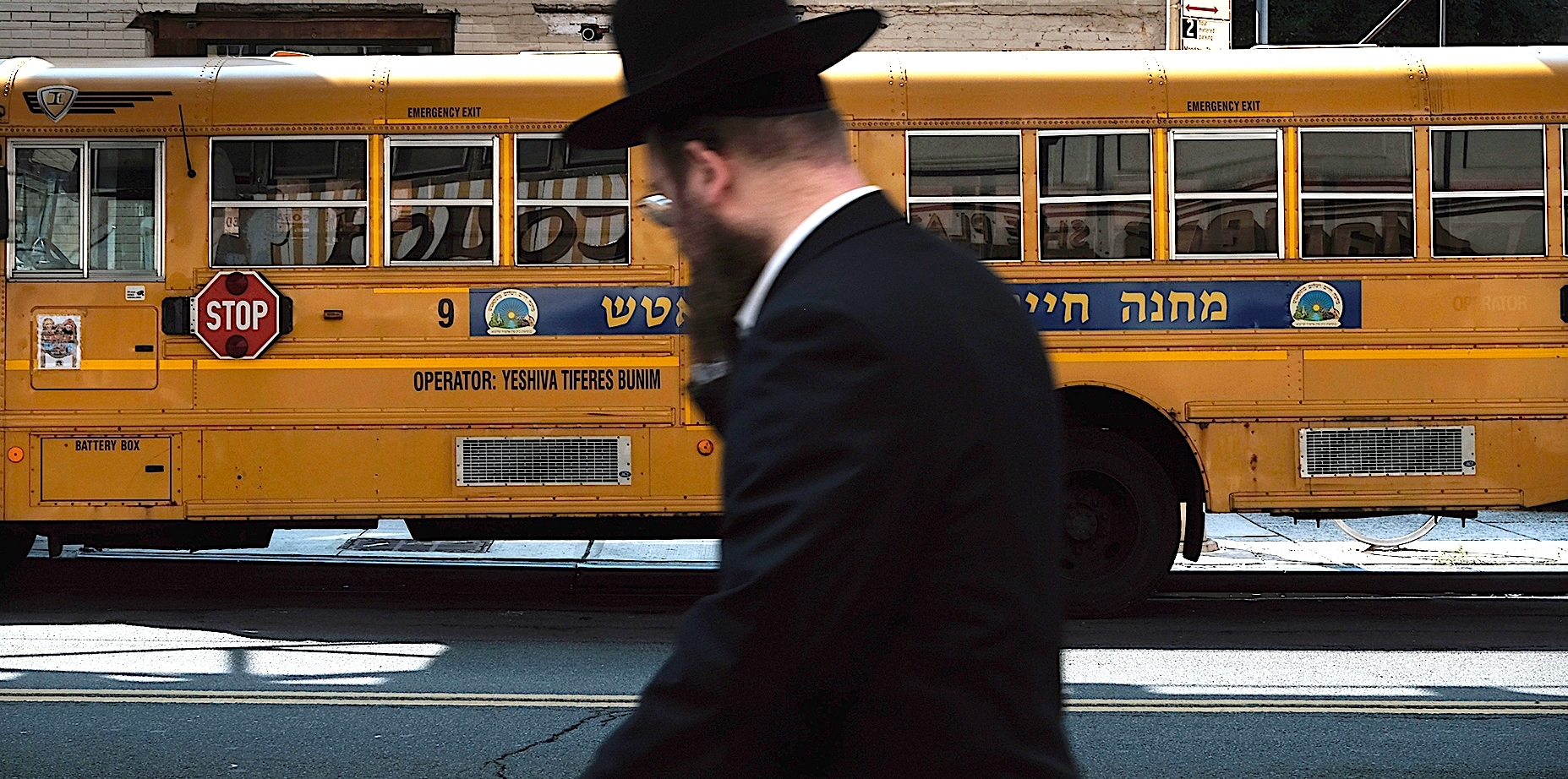
A yeshiva school bus drives through Brooklyn’s Borough Park on Sept. 12, 2022. That year, New York City saw increased scrutiny of yeshiva education standards, particularly regarding “substantial equivalency” to public schools. (Spencer Platt/Getty Images)
In the YouTube interview, Moster said he still believes in improving secular education at yeshivas, but not in the tactics of mounting a public pressure campaign. He said his desire to confront yeshiva leaders stemmed from the anger he once felt as a yeshiva graduate struggling to adjust to adulthood.
“I had a broken English, I had no high school diploma, I had no understanding even of how college operates, no foundational knowledge that sort of would help me through the college, even the application process, let alone actual college. So, yeah, I was pretty angry at the time and I felt like I had nothing to lose because I already felt sort of disowned or shunned by the community anyway,” Moster said.
Now, however, he says he has sympathy for the Orthodox leaders he once antagonized, recognizing their desire to preserve the status quo.
“Something that I wasn’t able to sort of acknowledge and admit at the time — that preservation of the community has a lot of value,” he said.
He also came to worry that the scorn he attracted could tarnish his family name and jeopardize the marriage and business prospects of his 16 siblings and many nieces and nephews.
“I felt like it was hurting my family,” he said.
Moster recalled his reaction to certain critics of his campaign — and how he came around to their point of view.
“They’d say, ‘you know, you’re right — there has to be change but it has to come from within and not only that, it’s actually already happening and I’m afraid you’re going to undermine it,’” Moster said. “And at the time I was… dismissing it, [saying] it isn’t really happening or ‘it’s not coming fast enough.’ But the truth is, I think it was. In fact, as both you and I know, the Hasidic community and the haredi community more broadly has undergone significant change in the last decade plus.”
According to Moster, he grew uncomfortable with some of his bedfellows as Yaffed sought allies in the progressive movement. He became particularly dismayed by the focus on trans identity among these left-wing allies.
“There was this assumption that if I am out there supporting secular education for Hasidic kids, I must also be on the bandwagon,” he said. “I must also be on board with encouraging trans content and such in the schools.”
Moster’s process of self-reflection accelerated as his own children were reaching school age and he and his wife were forced to confront decisions about their education. They ultimately enrolled their son in a Modern Orthodox school and relocated to be closer to it, embracing the community’s religious lifestyle, he said. It marked a dramatic turn for Moster, who had grown up Hasidic but had become almost entirely secular.
His attitude toward the Hasidic world has also changed. The benefits of Hasidic life are more readily apparent to him now, he said.
“When I walk in the streets of Boro Park … I see so much good,” he said, describing a recent visit. “You see these kids, it’s sort of in the evening… they’re walking around holding books, and they’re peering into storefront windows of bookstores. It’s like, this is beautiful. This is what you want.”
He said he had never aimed to undermine the positive aspects of Hasidic life, and that he belatedly realized some of his former allies did.
“There were plenty of people in my orbit who I can say probably were totally OK with the community and the yeshivas being destroyed,” he said. “I don’t want to be affiliated with people who are seeking to destroy the systems that are working really well.”
After leaving Yaffed, Moster founded Shtetl, an online publication dedicated to accountability reporting in the Orthodox world. The outlet was based on the idea that independent journalism should expose and reform systemic problems being swept under the rug by community leaders. It reported on allegations of sexual misconduct and corruption until publication all but ceased in recent months.
Now, Moster has abandoned his original vision, arguing that Shtetl’s journalism threatened to do more harm than good by undermining trust in otherwise valuable institutions.
“I was thinking maybe Shtetl could become a hub for content creators. I’m OK with if Shtetl, you know, shuts down. I don’t have to do that. It would be great if I can keep it going and if I can do something productive and helpful. But if not, that’s okay,” he said.
JTA has documented Jewish history in real-time for over a century. Keep our journalism strong by joining us in supporting independent, award-winning reporting.
